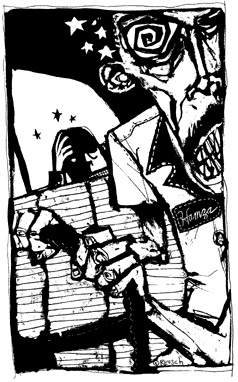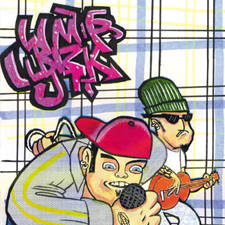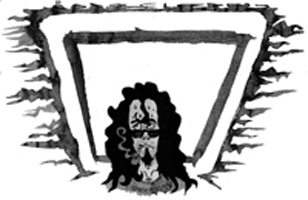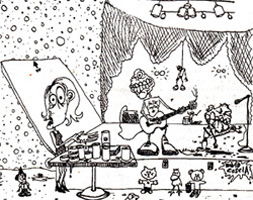 Down On The Farm
Down On The Farm
by Todd Brendan Fahey
Illustration by Mark Reusch
The phone rang around two in the afternoon. I tried to ignore it for the first five or nine rings, but suddenly became glad to have picked it up. An editor from Salt Lake City magazine was on the line, wanting to alleviate my temporal suffering by sending me to Jackson Hole, Wyoming, for five days, everything paid and nothing due in return.
“How does this work?” I wondered, twisting the phone cord around a finger, my heel tapping on the hardwood floor of my downtown apartment, a block from Temple Square.
“We do it all the time,” the editor said. “It’s called a FAM trip: media familiarization. Jackson’s Chamber of Commerce wants writers to promote its annual Old West Days, so they send a letter to all us West Coast glossy regionals. We’d usually assign a staffer to cover this kind of thing, but we’ve all been to Jackson Hole so I’m calling you.”
“You’re going to want an article out of it?” I wondered, struggling to make sense of the sudden turn of fortune.
“Probably not,” he said. “But it’s magazine policy to ask you if you have any ethical problem with this sort of assignment.”
I told him the only problem I could foresee now was a clock that told me I had exactly forty-eight minutes to pack, haul my ass down to the airport, and carry my luggage across the bubbling tarmac to avoid another lonely weekend in Salt Lake City.
“Relax,” he said. “I’ll send a taxi over to your place with the tickets. You just be ready.”
After filling a garment bag with clothes for a long weekend, I slapped a Tropical Holiday feeder against the inside wall of a new eighty-gallon aquarium I had purchased recently and for which I had sacrificed dearly. I knelt before the stylish octagonal tank and placed my nose against the glass, and watched the four unblinking eyes recede even further into the dark recesses of a custom-built “spawning cave” that had yet to foster any of the promised free-swimming cichlid fry. Then I went under the sink and fetched my receipts for the fish and the cave, along with a bottle of Clorox to use on the expensive little buggers if I did not return to children by Monday.
A horn honked out front. I jogged down the apartment steps and into the back of the taxi, which smelled vaguely familiar; the dull-red eyes staring back at me through the rearview mirror gave it away.
“I’d keep that stuff low, Akhmed. You’re in a whole different world.”
A gaunt, dusky-skinned young man grinned and bowed deeply from the driver’s seat, then eased the car into a steady flow of surface traffic toward Temple Square, beads of sweat glistening on his forehead. I rolled my window down and sank back in the seat, with a firm knowledge that in less than 90 minutes I would be riding bareback on some brute-steed, deep in the center of a cool Wyoming forest. But then a bone-chilling burst from a siren caused my driver to go all to pieces in the middle of the intersection.
“Jesus!” I was thrown sideways in my seat as the taxi jerked violently, narrowly missing a black stretch limo. Suddenly, we were in the center of a great confusion. “I hope you have your green card,” I muttered to the cabbie, who was sobbing into his hands.
A team of plainclothes agents descended upon our car with a grim determination: “Open-your-fucking-doors!” a man shouted. “Do it, do it!!!”
I shrugged and got out of the car, and felt the hot roof of the taxi against my cheek, eight or nine hands patting down every square inch of my body. After extracting the wallet from my back pocket, an agent retrieved the bogus press card I had earned from the three hours I once spent at the copy desk of the Salt Lake Tribune.
He smiled crookedly. “We got ourselves another maggot trying to cause the President trouble.” Then he turned to my driver. “And who are you: Abu Nidal?”
The cabbie bowed. “My name is Hamza Al-Assad. I am strong supporter of U.S. Democratic Party.”
“Oh bullshit,” the Fed snorted. “You’re all terrorists. It’s in your goddamn genes… and what’s that smell?”
I waved the cabbie off, stepping very lightly now. “It’s incense,” I said. “He was burning it when he picked me up for the airport; but I told him to get rid of it, it makes me sneeze.”
The agent eyed me coldly. “You’re in the middle of a Presidential motorcade,” he hissed through his teeth. “I don’t know how the hell you got here, but I want you to follow that car up ahead, then get the fuck out of this city block. I know how your kind works. In a couple seconds, this’ll be some sort of racial demonstration. You got that, Dan Rather? Just move your ass after the car in front of you.”
I nodded, saying nothing, and guided the trembling driver back into the front seat of the taxi. “Slowly,” I said, patting him on the shoulder. “You can do it. For godssake, just drive slowly.”
He nodded and worked his way through a clot of dark vehicles, which parted graciously to let us onto the freeway entrance. When we had scaled the onramp and leveled out heading west, I saw my driver engage the cruise control and open his glove compartment with two fingers, gripping the wheel with his knees. “It is time for the pipe,” he nodded inwardly.
“Why not?” I shrugged, my hands still twitching. “I thought we were going to get our heads blown off back there.”
“As did I,” he said, taking a stainless-steel Zippo to the bowl of an elegant porcelain drug utensil. He breathed in the vapors from a big chunk of hash, holding it in his lungs until I thought he might succumb to a fatal apoplexy. When he smiled, a blueish, perfumy cloud slid gruesomely through the cracks of his teeth.
He passed the burning felony back over his shoulder and I stared at it for several seconds, then drew on the hot cherry until it turned grey. “Local?” I wondered.
He grinned stupidly into the rear-view mirror. “It is very best from home.”
“And where would that be?” I wondered, settling back, feeling the onset of something I hadn’t in a long, long time a giddy numbness that anesthetized the length of my spine and turned my tongue to nylon.
“Very close to Tehran,” he said.
I shuddered again and sank down into my seat. “I don’t think we’re going to make it.”
He looked at his watch and nodded. “Then I will drive you.”
“To Jackson Hole, Wyoming?” I coughed. “I don’t think either of us could afford the fare.”
“There will be no charge. It is my obligation,” he said solemnly. “I am at your service.”
We drove by the Salt Lake International Airport, just to be sure, but before reaching the Delta loading area, I saw the Jackson Hole shuttle-hopper, the only one of the day, scream off the runway and into the sky, trailing behind it four streams of pale exhaust. Hamza shrugged and drove through the airport to an Arby’s near the freeway, the hashish now working furiously on the gland that governs one’s primitive urges of hunger. While he waited in line for our food, I jogged across the parking lot and bought two twelve-packs of beer at a convenience store; the drive, I knew, would be a grueling eight hours, and I planned on becoming comatose as soon into it as was humanly possible.
When I returned to the cab, Hamza sent me back into the 7-11 for a People magazine and a package of No-Doz, explaining that he had had no luck mixing hashish with liquor. “It is too pleasant,” he said. “Allah punishes men who seek such bliss without Him.”
It sounded plausible, but I was in no mood to discuss the superstitious complexities of Islam with a hash-addled neurotic whose crippling fear of crowded intersections had just caused me to miss tonight’s Chamber of Commerce-sponsored dinner at the Mangy Moose. I bought his bogus speed and a copy of People, and then ordered him back onto the freeway.
As I went to work on the twelve-pack, I came across an article about Sarah Ferguson, the Duchess of York who, it seemed, after ten years of criminal deception, had suddenly hit The Wall in her run at the Royal Marathon, which some now say is the greatest endurance test on the face of the planet. I had never liked her anyway (no amount of money or liposuction can make a silk purse look stylish off the shoulder of a Guernsey heifer), and it further convinced me that the Britishers should do to the Royal family what the Bolsheviks did to Czar Nicholas and his court, and that the spoils should be divvied 50/50 between the British commoner and the United States taxpayer to pay off some of their debt on the Marshall Plan.
But reading the article made me carsick. I swiped the pipe from the armrest and again turned the Zippo loose on the bowl. “So: how long have you been in my country?” I asked, exhaling.
He nodded, taking another turn. “My family came… eeer…” he said, slowly bleeding the smoke from his lungs, “in 19 and 79. My father was what you call `Major’ in Shah’s High Command. We fled in the month before the crazy man took control of everything. It was the only way.”
“Why here? Why not France?”
Hamza laughed bitterly. “We had heard that even a fool could become rich in America. But it was not so for us. My father ran away with one of your… beembos during first year of our residency; he left us nothing. If it were not for your welfare system, we would have surely starved.”
I gritted my teeth and untwisted the top from a second bottle of Coors, which I drank off in three swallows. “I’m so glad we could be of help.”
“You are right to sneer,” he nodded. “The world laughs at your stupid generosity. Your nation is like old woman in poker game. Please,” he motioned, refilling the pipe and passing it back again. “I would return all that my family has received from your country, if only I could find meaningful work. There is nothing in Iran; but there is nothing here, either.”
By the time we crossed the border into Evanston, Wyoming, I had killed off one bottle short of a six-pack and my bladder was beginning to spasm. “Go ahead and pull over at that truck-stop,” I said, pointing at a garish sign that promised: “FIREWORKS! REAL TURQUOISE JEWELRY! DON’T PASS US BY!” I had always been a sucker for explosives, and the call was impossible to resist.
Hamza followed me through the store and toward the restroom, where I saw him pause at a drinking fountain to wash down a small pile of No-Doz tablets. When I returned to the fireworks counter, he was already holding an oversized paper sack.
“That’s the spirit,” I smiled. “What’d you get?”
He grinned heavily and extracted a fifth of Myer’s dark rum from the bag.
“I thought you said you didn’t drink?”
He shook his head. “I said Allah does not approve. Today I find my own way.”
I pulled a twenty from my wallet and told the shriveled old man in soiled bibs behind the counter to load up a combination of Roman candles and bottle rockets. “And a couple hundred jumbo firecrackers. As long as I’m here.”
“Any ground spinners?” he suggested. “The kids loves them the best.”
I told him I wasn’t married.
“Yer smart,” he whispered, glanced slowly from side-to-side, then snorted deep into his sinuses, letting out a thick, tubercular cough.
It was just before three o’clock when we got back on the road, and it was not long after we had left the outskirts of Evanston that Hamza broke the seal on the bottle of rum and took a long pull. He had walked straight past the soda machine on his way out of the store, and I knew then that he had no intention of diluting his liquor. He took another drink from the bottle and offered it to me. I begged off politely, mumbling vaguely of my preference for cheap suds. About an hour later, my good judgement began paying dividends.
The highway through Wyoming was remarkably unchallenging, but between lighting his pipe and searching for a decent station amidst radio static and swilling from the half-empty flagon of rum, Hamza was having a tough time of it. Twice, I felt compelled to reach over the head-rest and hold the wheel, while he fumbled at his crotch for a burning cherry. About thirty miles from Jackson, I looked up into the rearview mirror and saw the stare of a fighter far gone on the ropes. It was then that I decided to take over.
“How ’bout pulling over right here, my man? I bet you could use a few winks.” I pointed to a wide shoulder a few hundred yards ahead and braced myself for a vicious argument, but Hamza simply took his foot off the accelerator and let the car roll to a stop in the center of the two-lane highway. “That’ll work, too,” I nodded. I helped the wilted young cabbie into the back seat, then hurried to return the cab to the speed limit before we were crushed to shrapnel by a four-axle Peterbilt that had been trailing not too far behind us for the last many miles.
From the back seat, Hamza began muttering about a life gone terribly wrong: “My friends are all investment bankers and jewel traders and wealthy arms merchants. They own mansions in Bel Air; they ski in Zurich in the winter with their mistresses.” He took a long swig from the bottle. “They call me less and less. When they do, they say, `Hamza, why are you still driving taxicab? Do you not want to be rich?’ Soon I will be friendless.”
I remained silent, knowing that I could not, nor would I wish to, conceal the joy from my voice.
He pushed two caffeine tablets through the aluminum shielding of the package and washed them down with more Myer’s. “I blame Ronald Reagan for my troubles,” he spat. “He is infidel who has caused Hamza such misfortune.”
I strained to follow his rare logic which proved exceedingly difficult, between the noisy suckling on the Myer’s jug and a frequent weeping and the lighting of the pipe, which he continued to share with me until we reached the town of Jackson but it went something like this: Hamza Al-Assad, the eldest son of a high-level military strategist for the late Shah Reza Pahlavi, enjoyed a life of playful opulence in his native Iran until 1979. His private chauffeur had introduced him to hashish and opium by the wizened age of eleven; at age fourteen, he lost his virginity to one of the Shah’s own nubians on a deck chair at the Presidential baths in full view of a score of profoundly disinterested sunbathers; as the eldest scion, he had been groomed in the art of counterintelligence and was slated to inherit somewhere in the neighborhood of sixteen-million dollars at the age of twenty-five.
It was The Portrait of a Young Man Lacking Nothing… until the glass cracked.
He could recall everything on the night his father, like so many among the Shah’s army, stole an F-14 and took his family screeching down a burning airstrip, carrying off millions in gold bullion looted from the Iranian treasury and what he prayed openly was enough fuel to deliver them to the sanctuary that he just knew would be the United States of America.
“He was right, of course,” Hamza shrugged. “For him, it was Paradise. After only six days, he met a young woman who admired him for his power. But she was a shrew. She convinced him to leave us in poverty. If I should ever see either of them again, I will take pleasure in killing them both.”
The tale grew blacker. At sixteen, while living in a roach-infested two-room hovel in a New York housing project with his mother and four younger siblings, Hamza found he had a taste for smack. He quit school and became an accomplished burglar, which kept him from a jones until the end of 1982 that was the year he had graduated to robbing liquor stores. As he told it, one night his connection hadn’t shown and his nose was running and he had a fever and he just wasn’t paying the kind of attention required for such a level of criminality, and a certain Harlem shop-owner saw it as a prime opportunity to test out the butt of his shotgun on the bridge of Hamza’s regal schnozz.
SOCKO!!
The New Year played rat-a-tat-tat on his rheumatic bones, enjoying, as he did, cold turkey inside a cell at Rikers Island. Fortunately, the cure took and he was released to a halfway house with a methadone program in Salt Lake City, where he had been driving a taxicab ever since.
“I should be in good college, studying medicine or economics,” he complained, “but I am drug felon. And because of your Mr. Reagan, I can no longer get a student loan. Besides,” he waved lamely, “I am wrong kind of minority.”
Hamza guzzled the dregs of the Myer’s, then rolled down the rear window to its mid-way limit and stared out at the rough-hewn storefronts of Jackson’s historic Main Street. “Here, every car is pickup truck,” he noticed. “They called your President ‘Cowboy.’ You are a nation of bigots.”
I was circling the town square for a second time, wondering what to do with Hamza, when he solved the dilemma for me. In rapid succession, I heard a rustling of paper low in the back seat, followed by what sounded like a hollow tinkling inside an empty Myer’s bottle, then a deafening howl, the whole Bottle Rocket Family screaming just past my earlobe and exploding against the front door of the Cadillac Bar and Grill
(to be continued…)
Todd Brendan Fahey is the author of Wisdom’s Maw: The Acid Novel; his collection of short stories, Dogshit Park & other Atrocities, will be published in late 1998.



